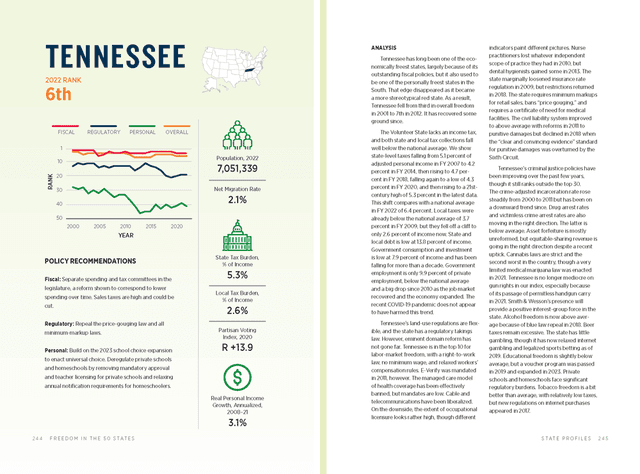Policy Recommendations
- Fiscal Separate spending and tax committees in the legislature, a reform shown to correspond to lower spending over time. Sales taxes are high and could be cut.
- Regulatory Repeal the price-gouging law and all minimum-markup laws.
- Personal Build on the 2023 school choice expansion to enact universal choice. Deregulate private schools and homeschools by removing mandatory approval and teacher licensing for private schools and relaxing annual notification requirements for homeschoolers.
Analysis
Tennessee has long been one of the economically freest states, largely because of its outstanding fiscal policies, but it also used to be one of the personally freest states in the South. That edge disappeared as it became a more stereotypical red state. As a result, Tennessee fell from third in overall freedom in 2001 to 7th in 2012. It has recovered some ground since.
The Volunteer State lacks an income tax, and both state and local tax collections fall well below the national average. We show state-level taxes falling from 5.1 percent of adjusted personal income in FY 2007 to 4.2 percent in FY 2014, then rising to 4.7 percent in FY 2018, falling again to a low of 4.3 percent in FY 2020, and then rising to a 21st-century high of 5.3 percent in the latest data. This shift compares with a national average in FY 2022 of 6.4 percent. Local taxes were already below the national average of 3.7 percent in FY 2009, but they fell off a cliff to only 2.6 percent of income now. State and local debt is low at 13.8 percent of income. Government consumption and investment is low at 7.9 percent of income and has been falling for more than a decade. Government employment is only 9.9 percent of private employment, below the national average and a big drop since 2010 as the job market recovered and the economy expanded. The recent COVID-19 pandemic does not appear to have harmed this trend.
Tennessee’s land-use regulations are flexible, and the state has a regulatory takings law. However, eminent domain reform has not gone far. Tennessee is in the top 10 for labor-market freedom, with a right-to-work law, no minimum wage, and relaxed workers’ compensation rules. E-Verify was mandated in 2011, however. The managed care model of health coverage has been effectively banned, but mandates are low. Cable and telecommunications have been liberalized. On the downside, the extent of occupational licensure looks rather high, though different indicators paint different pictures. Nurse practitioners lost whatever independent scope of practice they had in 2010, but dental hygienists gained some in 2013. The state marginally loosened insurance rate regulation in 2009, but restrictions returned in 2018. The state requires minimum markups for retail sales, bans “price gouging,” and requires a certificate of need for medical facilities. The civil liability system improved to above average with reforms in 2011 to punitive damages but declined in 2018 when the “clear and convincing evidence” standard for punitive damages was overturned by the Sixth Circuit.
Tennessee’s criminal justice policies have been improving over the past few years, though it still ranks outside the top 30. The crime-adjusted incarceration rate rose steadily from 2000 to 2011 but has been on a downward trend since. Drug arrest rates and victimless crime arrest rates are also moving in the right direction. The latter is below average. Asset forfeiture is mostly unreformed, but equitable-sharing revenue is going in the right direction despite a recent uptick. Cannabis laws are strict and the second worst in the country, though a very limited medical marijuana law was enacted in 2021. Tennessee is no longer mediocre on gun rights in our index, especially because of its passage of permitless handgun carry in 2021. Smith & Wesson’s presence will provide a positive interest-group force in the state. Alcohol freedom is now above average because of blue law repeal in 2018. Beer taxes remain excessive. The state has little gambling, though it has now relaxed internet gambling and legalized sports betting as of 2019. Educational freedom is slightly below average, but a voucher program was passed in 2019 and expanded in 2023. Private schools and homeschools face significant regulatory burdens. Tobacco freedom is a bit better than average, with relatively low taxes, but new regulations on internet purchases appeared in 2017.

